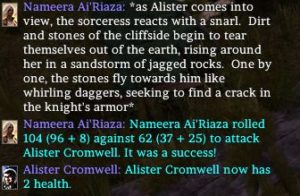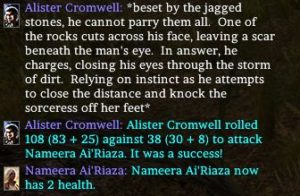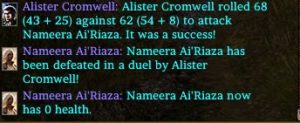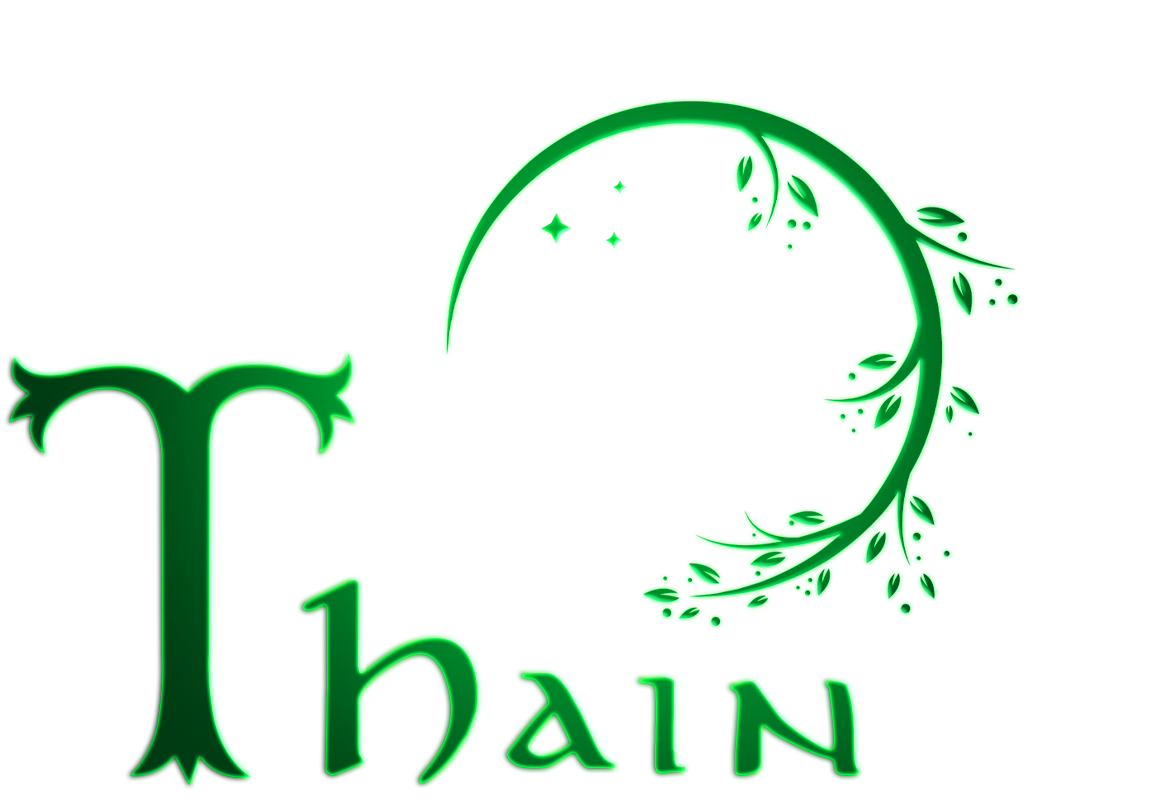What Is /Duel?
Conflict is a key aspect of NWN roleplay. Conflict drives almost any kind of narrative, and in a fantasy world like ours, the conflict that comes from different factions or ideals will often pit characters against one another.
However, mechanical PvP is often a poor answer to playing out a fight between two characters. Mechanical NWN PvP tends to reward power-building and optimization. It rewards reflexes, cheesy instant-kill strategies and “firing the first shot”, even in moments where you might want to be able to stop and think, or type an emote. Mechanical PvP has its place, but it is a poor choice for many kinds of narrative scenes. Focusing too much on mechanical PvP as conflict resolution can easily drive players into optimizing their character above all, and drive out any players unwilling to do so.
The /duel system is one answer to this problem. It is an alternative system for playing out conflict scenes that can be used to provide uncertainty while keeping to a slow-paced emote-driven style.
- It is a turn-based system. You can take as much time as you want to type.
- It is mostly randomized. Your stats (other than your character level) have no affect on the outcome, so there is no benefit to power-building.
- It is versatile enough to be used in a range of conflict scenes.
- It is a system where it is impossible to know the final outcome of a battle before the battle ends.
/Duel is useful for conflicts where both players might want to be surprised by the outcome, and both players are willing to accept either a win or a loss. A /duel is a series of coinflips – win enough coinflips before your opponent does, and you defeat them.
How Does It Work?
Nameera and Alister, a paladin and a sorceress, approach one another atop a high cliff. The players are good friends and ready to collaborate, but the characters they are portraying are bitter enemies. These two have built up a conflict between them over several sessions of roleplay, and it’s time to see who will defeat who in a final showdown.
To start, one player types /duel followed by the name of their opponent. The opponent sees a message indicating that they have been challenged.

The opponent, in turn, types /duel followed by the name of the Challenger. As the /duel begins, both characters will glow blue to indicate that they are engaged in a roleplay duel. In a standard roleplay duel, both combatants begin with 3 health.

By coinflip, The system selects Nameera to go first. It is now her turn. On her turn, she writes a text emote describing her attack. This can be simple, or in-depth – a sentence or a paragraph. The important thing is that it describes how she attacks, what her character might do, and gives her partner something to work with when it comes time to write his response. When she is finished writing, she follows up the emote by typing /duelattack and the system makes her roll.

Nameera’s roll is a d100 + her level, with Alister’s defense being the same. She rolls higher, and so her attack is a success and Alister loses a point of his health!
Now it is Alister’s turn to do the same. He can emote his response to Nameera’s attack, write about how the jagged rocks affect him, and how he attacks in turn.

The /duel continues in this manner until one player or the other is reduced to 0 health. When this happens, the duel is over and a clear winner emerges.

The players can now continue to resolve the conflict as they will. Perhaps Nameera is captured by the paladin’s order, or perhaps she will make a narrow escape! It is up to the players how to resolve things after the fight, and we encourage players to collaborate on outcomes and to do what is best for their personal stories.
When to use /duel
This system is used by mutual consent. It is useful in player-events and collaborative narratives in which players wish to have a fight where neither player knows the outcome going in. A duel can be high-stakes for both characters in the game, but the important thing is that the players have fun and use it as an opportunity to build up both characters.
Due to the nature of the system, /duel is best used when:
- You want to collaborate OOCly with your opponents and avoid the hard feelings of mechanics PvP.
- You want to play out a fight more slowly and methodically than mechanics allow.
- You want to incorporate character development and roleplay into your fighting. For example, a boss fight with /duel in a player event might be a chance for the players to show off their abilities in a deeper way.
- You are okay with either winning or losing.
- You have a bit of time to commit – /duels can get surprisingly long with some players, especially if the dice are not with you.
- You want to use the system in creative ways – we’ve seen /duel used for naval battles, social scenes, PvE boss fights, and all kinds of other conflicts.
/duel is not ideal when:
- One side absolutely must win. Because the system is random, /duel is not a good fit for PvE-style encounters that are intended for the players to always claim victory. If the only possible outcome of losing a /duel is a TPK, the system may not be a good fit.
- Players are uncomfortable with losing. Players who are deeply uncomfortable with ever losing should take it upon themselves to stay well away from conflict RP.
- Players care deeply about having a strong influence on the outcome. /Duel is mostly random and is designed to surprise you. Even your powerful character can lose if the dice are not in your favor.
Note that if you agree to a /duel, you are obligated to play out the consequences. However, you are not allowed to continue fighting afterwards. If you or your party agrees to a /duel and you lose fair and square, you are defeated. Maybe you escape or run away, but you cannot stay around and keep taunting your opponent or trying to push for a mechanical fight afterwards in the hopes that you’ll succeed. You were defeated and must play out that defeat in some way.
